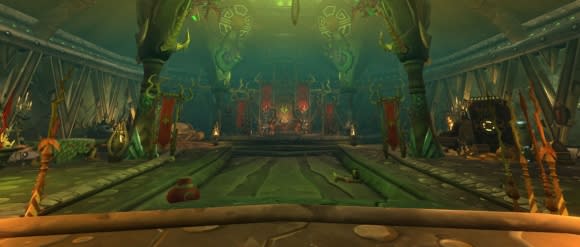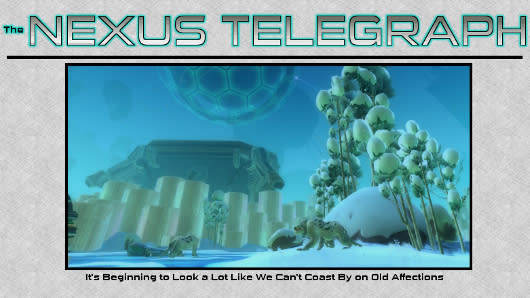The Nexus Telegraph: Addictions that WildStar must kick
Matt Daniel is a friend of mine. (Yes, despite my claims at the end of some poorly considered features we did together.) He's also a spectacularly bright guy with a clear picture of what games do well and what they do poorly. So when he and I wind up chatting about WildStar and noting the exact same problems, I take this stuff to heart. And there are a couple of underlying issues that the game would do well to address sooner rather than later.
I've talked about issues that the game has before, but a lot of those issues are really symptoms, not the core issues. I enjoy the game a lot, and I think it has a lot to recommend it, but there are some nagging fundamental issues, just certain ways of viewing the game and the community. As we approach the all-important three-month mark, it's time to start thinking about those issues, about what they represent, and perhaps most importantly about how those issues can be addressed.

The siren song of randomness
Basically every Architect I meet loves the crafting system in the game... in theory. In practice, Architects mostly have some combination of swear words for the fact that trying to get a non-standard crafting result off a schematic requires a bit of planning and a lot of luck on their part. Even once you've crafted something the first time, you have to luck out with getting the target area back on subsequent crafts.
My highest-level character is a Weaponsmith, but I run into the same problem. A sword I craft that has Brutality or Tech as a locked-in unchangeable stat is a sword that's a lot more attractive than one with Insight. Or Finesse. Rather than turning the crafting process into a puzzle of cleverness and skill, it comes down to rolling the dice and hoping against hope that you have a starting position worth expanding upon.
The game's love of randomness is shot through the game as a whole. Challenges are great, but the rewards are a slot machine that offers you limited control over what you get, even if there's only one thing in the mix that you need or want. Boss drops are the same old "slay and pray" that even World of Warcraft got tired of back in 2007. I've watched the little Simon game give me the same color in a row seven times, making the game less about memory and more about counting my clicks to ensure I didn't click the constant flash of orange too much.
I've said many times in the past, here and elsewhere, that randomness isn't challenge. It's just, well, random. Not only that, but in this case it weakens some of the coolness of systems like challenges and crafting by making them less about using your skill to overcome obstacles and more about using your skill to hope you can overcome a disadvantage. Put more simply, randomness is a spice; overuse it and the meal just tastes bad.

The fiction of being hardcore
The idea of ranking a group's progress through an adventure and a dungeon is a noble concept. It is also one that has led to some really toxic crap, and if you don't think the two are connected, I've got a bridge to sell you.
Carbine Studios is well aware of the issues with prioritizing gold runs over everything else when it comes to this stuff, and it's being addressed, but it speaks to a larger problem: The game is schizophrenic. On the one hand, it encourages you to look how you want, play how you want, and do what you want. On the other hand, it pushes you constantly to be the most hardcore forever, smash the dungeons, yeah! The two go together like magnets of identical polarity, which is to say that they push one another apart with great force.
It's a subset of the problems that happen with open PvP. When you create an environment that rewards the most hardcore players above all else, those players who cannot, will not, or do not just say, "Well, I guess this content isn't for me." Cue the creation of a population that has suddenly re-calibrated its bottom upward; even among the people who can, will, and do want to be hardcore, there's still the worst group of players therein. So they get marginalized, and so on.
This is why I tend to not have very nice things to say about the game's ongoing love affair with raiding: because it's pushing a huge chunk of the game's content and rewards to serving a top end. When you're tiering your players such that someone winds up on the bottom, a lot of players just lose interest. They're here to have fun, not to be in competition. It's ridiculous enough in games that have positioned themselves to be about an ever-ascending power curve and nothing else, but even more problematic in a game that offers so many opportunities to say, "Eff that; I want to decorate my house and look pretty."
Or, to put it more simply, a lot of games are offering the hardcore rush. Not many are offering the lateral game. I know I'd rather compete in a field that isn't choked.
The lure of legacy
MMOs have changed a lot since Ultima Online. They've changed a lot since EverQuest. Since World of Warcraft. Since I started this job five years ago. And yes, by and large, those changes have been for the better, judging by the simple fact that there are a lot of people interested in MMOs now who were not interested back then.
I honestly believe that in another five years, we as a community are going to look at hardcore raiding the same way we currently look at Ultima Online's open PvP, as something that MMOs survived in spite of rather than because of. We're already seeing traces of that. There's a reason that almost no game does the straight vanilla World of Warcraft 40-person raid, complete with ornate attunement processes. It's the same reason MMOs have largely discarded the idea that you should form a group, camp in a spot, and drag single enemies to you to kill them, or the idea that you should sit and ride a boat in-game for two hours.

WildStar's clear nostalgia for the original days of WoW has done some very good things for the game. It's infused it with a sense of humor that doesn't gut the tone of the game as a whole. It's given the designers a sense of confidence and clarity when moving through storylines and establishing NPCs. It's one tempered, in many places, by an understanding of what old faithful did wrong, both in terms of progress and lacking features.
But it's also given rise to a lot of old ideas that were wisely discarded years ago because it turns out they're not all that fun. And that lure of the old days, of how things used to be, is a powerful one. Remembering the bright parts of how things used to be and forgetting the downsides is tempting.
Of course, it's also the same principle as buying an entire pie and wondering why you don't do that all the time, only to find out when you're halfway through that you got really sick the last time you did this and you remembered only the first few bites.
Feedback, as always, is welcome in the comments below or via mail to eliot@massively.com. Next time around, I'm sure we'll have more news to discuss -- but on the off chance we don't, look forward to a list of things that WildStar does wonderfully and shouldn't change at all.

Here's how it is: The world of Nexus can be a dangerous place for a tourist or a resident. If you're going to venture into WildStar, you want to be prepared. That's why Eliot Lefebvre brings you a shiny new installment of The Nexus Telegraph every other Monday, giving you a good idea of what to expect from both the people and the environment. Keep your eyes peeled, and we'll get you where you need to go.


